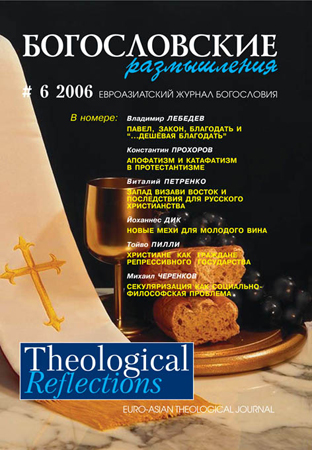Christians as Citizens of a Persecuting State: A Theological and Ethical Reflection in an Historical Perspective
Keywords:
Christians as citizens of a persecuting state, anabaptists developed a theology of separation from the wider society, Soviet Evangelicals, Church and State, between Jerusalem and BabylonAbstract
This article explores the Christian experience in an environment of persecution. Five case studies throw light on theological and ethical dilemmas and challenges which persecuted Christians in different historical periods have had to face. Early Christians had to learn how to deal with a transition from a persecuted community to a privileged group, and to find forgiveness for compromises and mercy towards traitors. The case of Waldensians raises the issue as to what extent it is possible to conform to outward pressures without losing one’s religious identity. Anabaptists developed a theology of separation from the wider society, and their story can help present-day Christians living in hostile environments to find ways to maintain healthy resistance to external pressures, however, without becoming a closed community. Protestants in Tsarist Russia prompted persecution from the governing church and state structures because their religious identity was interpreted as rejecting ethnic and national identity. The fifth brief case study offers some insights into the questions of Soviet Evangelicals: Can choosing a ‘lesser evil’ in relations with an atheistic state lead to denying one’s identity? Should more attention be paid by persecuted Christians to maintaining an atmosphere of trust among their communities? The article, deriving information from the wider church historical panorama, can serve as an introduction to further and more detailed research on the topic.
References
- Without references and bibliography.
Downloads
How to Cite
Issue
Section
License
Copyright (c) 2020 Toivo PILLI

This work is licensed under a Creative Commons Attribution-NonCommercial 4.0 International License.
All articles published in the Journal are distributed under a Creative Commons Attribution-NonCommercial 4.0 International License
By submitting an article for publication in Theological Reflections: Eastern European Journal of Theology the author grants the editors the right to publish the article and distribute it in electronic and print form.
The author reserves all copyrights and the right to use the materials of the article in whole or in part for educational purposes, to write his own dissertations, to prepare abstracts, conference reports, oral presentations, etc., as well as post electronic copies of articles (including the final electronic version downloaded from the journal’s official website) on non-commercial web-resources without the consent of the editorial board and founders.



